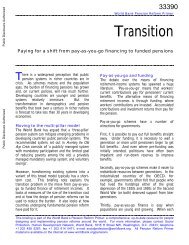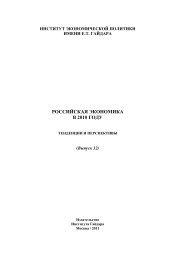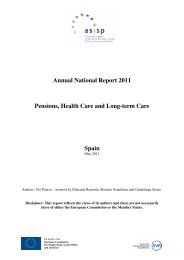Financial Sector Development in Africa: Opportunities ... - World Bank
Financial Sector Development in Africa: Opportunities ... - World Bank
Financial Sector Development in Africa: Opportunities ... - World Bank
Create successful ePaper yourself
Turn your PDF publications into a flip-book with our unique Google optimized e-Paper software.
Hous<strong>in</strong>g F<strong>in</strong>ance 115<br />
countries, down to those with the lowest levels of slums. The overall total<br />
for <strong>Africa</strong> shows that <strong>in</strong> 2005, there were some 175 million city dwellers<br />
liv<strong>in</strong>g <strong>in</strong> slum conditions equivalent to over 50 percent of the urban<br />
population. While some progress has been made <strong>in</strong> reduc<strong>in</strong>g this ratio as<br />
part of the Millennium <strong>Development</strong> Goals program, the absolute level<br />
of slum dwellers rema<strong>in</strong>s high.<br />
Hous<strong>in</strong>g F<strong>in</strong>ance as a Driver of Growth<br />
A central theme of global policy is currently how to stimulate job creation<br />
and f<strong>in</strong>d the road back to growth. The benefits of promot<strong>in</strong>g hous<strong>in</strong>g<br />
as a policy objective <strong>in</strong>clude both the tangible improvement <strong>in</strong><br />
people’s liv<strong>in</strong>g conditions and the potential impact of construct<strong>in</strong>g hous<strong>in</strong>g<br />
as a way to create jobs. Many of the jobs will be low skilled and are<br />
therefore very accessible and can come on-stream rapidly. For countries<br />
such as Nigeria, which currently have unemployment reach<strong>in</strong>g as high as<br />
50 percent of the population, the types of jobs that hous<strong>in</strong>g development<br />
would create would have broad benefits for all strata of the population.<br />
This section of the chapter considers a theoretical framework of benefits<br />
aris<strong>in</strong>g from hous<strong>in</strong>g f<strong>in</strong>ance.<br />
Economic Benefits of Hous<strong>in</strong>g F<strong>in</strong>ance<br />
The section below provides some theoretical background on the<br />
importance of hous<strong>in</strong>g f<strong>in</strong>ance as a driver of growth, as well as some<br />
of the other externalities that result from <strong>in</strong>vest<strong>in</strong>g <strong>in</strong> hous<strong>in</strong>g. Much<br />
of this background is directly applicable to the current situation <strong>in</strong><br />
<strong>Africa</strong>:<br />
• Deepen<strong>in</strong>g f<strong>in</strong>ancial access. There is a broad literature on the impact of<br />
deepen<strong>in</strong>g f<strong>in</strong>ancial access on poverty levels (Beck, Demirgüç-Kunt,<br />
and Lev<strong>in</strong>e 2007; Honohan 2008). Ga<strong>in</strong><strong>in</strong>g access to f<strong>in</strong>ance can be a<br />
way out of the perpetual cycle of poverty that is prevalent at the bottom<br />
of the <strong>in</strong>come pyramid. This poverty trap is well illustrated <strong>in</strong> the<br />
book Portfolios of the Poor: How the <strong>World</strong>’s Poor Live on $2 a Day<br />
( Coll<strong>in</strong>s et al. 2009), which chronicled <strong>in</strong> detail the f<strong>in</strong>ancial lives of<br />
households <strong>in</strong> India, Bangladesh, and South <strong>Africa</strong>. It describes how,<br />
without credit, it can be extremely difficult to climb out of poverty<br />
for the poorest among us. Credit allows unexpected events to be confronted<br />
without caus<strong>in</strong>g a slide back down to the bottom of the<br />
<strong>in</strong>come distribution.







